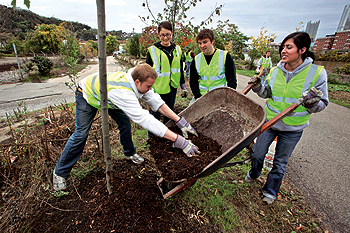Tree Tenders Care for Region’s New Trees
The Western Pennsylvania Conservancy‘s Community gardens and greenspace program implements a variety of greening strategies throughout the region, partnering with neighbors, funders and volunteers to ensure healthier environments. WPC aims to create several new green spaces in the Greater Pittsburgh region over the next decade, based on an analysis of the greenspace needs of downtown Pittsburgh. Moreover, the organization will continue to plant trees across the region through its urban forestry initiative, focusing on areas with sparse tree cover. Community members across the area are eager to have trees added in their neighborhoods; with additional funding, the Conservancy can provide street trees to additional communities.

Volunteer tree tenders spread mulch on a newly planted tree near downtown Pittsburgh.
Patty Renwick frequently tours the Troy Hill section of Pittsburgh, surveying the wellbeing of her often-forgotten neighbors. She makes sure they are happy, healthy and well fed. If they get hit by a car, she straightens them with stakes and ties. You could say she cares for them as much as anyone living in her neighborhood – it’s just that these neighbors are ginkos, elms and Japanese cherry trees.
When Renwick volunteered about four years ago to be a TreeVitalize Pittsburgh Tree Tender—a trained volunteer who is certified to help plant and maintain new trees—she promised to regularly weed, mulch, water, prune and otherwise maintain the dozens that the program planted in her neighborhood. Renwick took classes to learn her new duties and organized plantings around Troy Hill.
“I’m not ashamed to call myself a tree stalker,” Renwick said with a laugh. “It’s the least I can do, considering that trees give so much to me – oxygen, beauty, shade. In general, they make my neighborhood a better place.”
Now that TreeVitalize Pittsburgh has passed its goal of planting 20,000 trees in the region in the last five years, it’s important to remember a central component of the project: tree care. “Significant resources are invested in planting the trees and caring for them ensures that this investment is protected,” said Jeffrey Bergman, director of TreeVitalize Pittsburgh.
The Western Pennsylvania Conservancy manages TreeVitalize with the help of its partners – Tree Pittsburgh, Allegheny County, the City of Pittsburgh and the Pennsylvania Department of Conservation and Natural Resources, which is also one of the initiative’s top funders. Tree Pittsburgh orchestrates the training of the Tree Tenders.
The partners made a commitment to plant thousands of trees in the region because the trees benefit communities in a number of ways, including producing oxygen, remediating storm water, purifying the air, sheltering wildlife, decreasing energy usage and increasing property values. All told, Pittsburgh’s street trees provide $2.4 million annually in economic and environmental benefits.
The trees that have been planted in the region are cared for by contractors, WPC staff, local residents and Tree Tenders. In fact, all TreeVitalize community planting projects require at least one certified Tree Tender for every 10 trees planted.
“Most of our work is within the city neighborhoods but over 25 percent of our total Tree Tenders are from outside of the city, representing nearly 70 distinct municipalities, and that number is growing,” said Joe Stavish, community education coordinator of Tree Pittsburgh. “While our focus remains on low canopy city neighborhoods, it is great to see trees becoming a priority throughout Allegheny County.”
Tree Pittsburgh orchestrates training of the tenders. When they begin, the volunteers participate in a daylong course during which they learn about urban forestry practices, tree biology and health, proper planting, pruning and maintenance. The course also teaches the volunteers how to lead their communities in organizing tree plantings and tree care.
In the last five years, the partners have trained more than 2,100 tree tenders.
“These are remarkable people who are taking time out of their lives to help their communities,” Bergman said. “They are making a difference in Pittsburgh, planting trees and caring for existing ones. They are ensuring a healthy urban forest for generations to come.”
In addition to DCNR, the TreeVitalize Pittsburgh project has received financial support from the Colcom Foundation, The Heinz Endowments, the Richard King Mellon Foundation, the Pittsburgh Foundation, the Alcoa Foundation, Direct Energy and the Home Depot Foundation. The program has also received significant support from the Pennsylvania Infrastructure Investment Authority, also known as PENNVEST.
